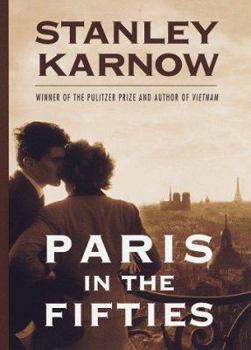Paris in the Fifties
Select Format
Select Condition 
Book Overview
In July 1947, fresh out of college and long before he would win the Pulitzer Prize and become known as one of America's finest historians, Stanley Karnow boarded a freighter bound for France, planning... This description may be from another edition of this product.
Format:Hardcover
Language:English
ISBN:0812927818
ISBN13:9780812927818
Release Date:October 1997
Publisher:Crown Publishing Group (NY)
Length:352 Pages
Weight:1.26 lbs.
Dimensions:1.3" x 5.8" x 8.6"
Customer Reviews
5 ratings
Vigorous Memoir
Published by Thriftbooks.com User , 15 years ago
A lively and vigorous memoir about the life and times in Paris, France and the Mediterranean. Added bonus: excellent drawings or sketches by Karnow's wife Annette. Kudos to Karnow's wife #1 for roughing it out in the USA.
I Loved Paris in the Fifties
Published by Thriftbooks.com User , 18 years ago
Having lived in Paris during the late 'fifties, I was immediately attacted to the Karnow book by its title. Upon reading the book, I wasn't disappointed. It was an easy read, partly because of the subject matter and partly because Mr. Karnow is such an excellent writer. The history lesson was great!!
Excellent recounting of France (not just Paris) in the 50s
Published by Thriftbooks.com User , 21 years ago
The title of this excellent book is a misnomer. Although there is a great deal about Paris, the book as a whole rambles over much of France and even the Mediterranean. Beginning in the late 1940s when Karnow first went to Paris on the GI Bill to study and through much of the 1950s when he served with TIME in their Paris office Karnow lived in Paris. This book is a distillation of his memories and notes he kept from that period. Karnow, however, gives himself free rein to range over a host of topics, sometimes delving into French history, if it helps illuminate his topic. The result is a very personal view of France in the fifties. There is a great deal he doesn't discuss, such as French cinema and art in the decade. He writes of some of the literary figures, but not with any especial emphasis. The range of topics that are covered in the book are not encyclopedic but they are exceptionally varied. He will write about wine, food, crime, famous politicians, infamous politicians, housing, French manners, Algerian patriots, people he knew, and a host of other subjects. Some of the chapters could be anticipated, such as a long chapter on French wine and a tour through the French wine districts. Some are unexpected, like a chapter on a man who was the last in a line of hereditary executioners. There is a good deal of name dropping (folks like Samuel Beckett pop in for brief cameos), but not too much. He writes of people whose names remain famous, like Christian Dior, and of many others, especially colleagues, whose names are not so well known.One of the best things about the book is that while it may not give you all the facts about Paris and France in the fifties, it definitely gives you a feel for the time itself. It is also fascinating for what it reveals about the politics of the time. Karnow worked for TIME, which espoused a conservative Republican point of view (though more moderate than what would later characterize the late 1950s NATIONAL REVIEW), while Karnow himself was a liberal. In much of his political writing, therefore, one gets a sense of his take on one things on the one hand and the take of his employers, looking over his shoulder, on the other. The book therefore indirectly tells the story of how much of America felt about France during the fifties.I can wholeheartedly recommend this book to anyone interested either in the years following the war or in France or Paris in general. It is entertaining and informative at the same time.I'd like to add that the photograph on the paperback edition of the book (and I supposed on the dust jacket of the hardback) is one of the most remarkable I have ever seen of Paris. A couple somewhere in Paris (the angles make it look to be somewhere east of Montmartre) looks over Paris with Notre Dame and the Eiffel Tower off in the distance.
Why are the French the way they are today? Read background.
Published by Thriftbooks.com User , 26 years ago
Chapter 15 on the youth of France is worth the price of the book alone. Times were hard in the 1950s and Karnow knew it and wrote about it. "What do we want? A decent life and I don't know how to attain it", says a 27 year old worker whose wife also works and together have a very limited life. What do the French think about food, work, wine, sex, intellectuals, language, fashion, Coca Cola? It is all here in this delightful book and it is not what Americans think. Yes, it is a report from a foreign country.
Highly readable. Conveys the heart and soul of Paris.
Published by Thriftbooks.com User , 27 years ago
Karnow, with the succinct style of a journalist brings the reader Paris and its people extracted from his writings when he worked for Time Magazine's Paris bureau. He surely could have handed us a dry hit parade of his journalistic coups; instead he gives us insights into the Ville Lumiere and its people in a decade of healing and recovery following WWII. This book is alive. After reading it, you'll better understand why Thomas Jefferson called France every traveller's favorite country after his own..





